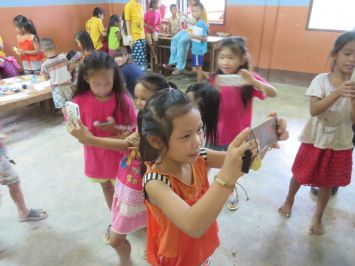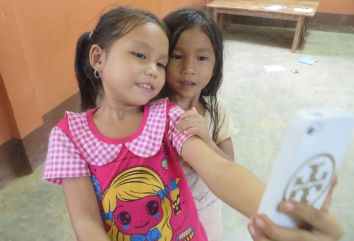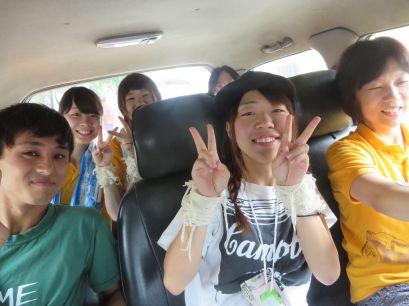I woke up late, around 7AM, and read the news from the Tea Party News Network and Fox News on the internet. I can see the Mekong River out the big windows. I slept with them open and could smell breakfast cooked on charcoal on the sidewalk one floor down. I drank all the in-room coffee, which is never enough, and headed downstairs. There was an Asian woman busy on her computer and I sat at a table near her to order breakfast. I asked if she was from China. A European might say, I am from Germany or England. She said, “I am Japanese,’ with the emphasis you expect. I think I say, “I am from America.” As I told my son on our first trip to Asia together over 10 years ago, every one has a story and it is fun and interesting to get them to tell it. You won’t even ask, or listen, if you judge first. Her name is Miki. It’s easy to remember as it is written on her shirt. Miki is a professor at a university in Japan and on a trip with about 15 students who raised money to build a school in a village in Lao. . They raised $9000 in their home city in Japan. Miki is also doing research and publishing a paper about the lack of education for minority tribes in Lao, specifically for girls. “Are you researching how the Hmong helped the CIA during the Vietnam War?” “Yes, of course.” I could tell she took a new interest in me. I said that I knew the Hmong were a tribe without a country. No one claimed them. They have their own language and used to wander between Lao, Northern Thailand, Myanmar, Vietnam, and Cambodia, often crossing a border to escape whomever was after them at the time. They know the jungle better than anyone. They are also desperately poor. For a few dollars, the CIA was able to hire them to help find the caravans on the Ho Chi Min Trail in Laos and Cambodia, regions the U.S. claimed they never were. When the CIA left, and the Vietnamese moved in, it did not go well for the Hmong. I asked Miki what her husband did. I forgot…I didn’t really care, only wanting to know if she was married. Miki said she was going to the village where the school had been built after breakfast. “Can I go?’ “There are only enough seats in the van for the people we have, but one girl is sick and might not be able to go.” The poor Hmong had offered her food, and she ate it rather than refuse. Her bad luck was good news for me. Miki checked on her, but she was not getting out of bed. Off we went, for one of the best days I had in a long time. I was outside my own head, grateful for who I am and all I have seen, what I have, and what I have accomplished. I learned a lot from these poor villagers, and the Japanese who were kind enough to bring me along.
Miki switched to English when she talked to me, then to Lao, or Japanese effortlessly. In my next life, I want to speak three or four languages. I will live in the world then, even more so than I do now, not one country. My son has learned to speak Khmer, lives in living in Cambodia, and I envy him.
We had a wonderful chat in the van as we went along a tributary to the Mekong. The university students had an American in the car, and asked Miki if it was OK to ask questions of me. I loved it that they had the courtesy to ask. I was pleased to have a chance to talk to them, and took my responsibility seriously.
It was uphill for an hour, into the mountains and the jungle. It was an important day for the Japanese, the anniversary of the bombing of Nagasaki. These twenty-year-old students and their 40-year old PhD professor were against it, of course. As horrible as it was, I said I was not, which surprised them. The battles as the U.S. got closer to Japan became more horrible. Iwo Jima and Okinawa were fierce and deadly fights, muddy, filthy, with both sides hungry or starving, and only a handful of Japanese survivors and massive casualties on both sides. In Okinawa, the survivors were jumping from cliffs, thinking death was better than facing the American monsters. The Russians had just entered the war on Japan, knowing it was ending but wanting their share of the spoils. The war needed to end, and end fast. The U.S. was war-weary, and starting to move troops from Europe for a costly invasion projected to last until 1950, with even more death, and two Japans likely as the Russians clamored for division of Japan, not just the Sakhalin Islands. “But there must have been another way,” they said. Maybe. But the war had to end. They did not agree with me, of course, but agreed to study the war. We pleasantly ended that discussion as we arrived at a muddy road to the village.

The van driver turned us all loose a few hundred yards from the school. It was pouring rain, and the downhill road slick with mud. I suspect the van would be stuck at the bottom or have slid off the rutted path. I pulled on my $200 international orange Marmot rain jacket, designed for blue water sailing with a bit of guilt. The village family could live for a year on what I spent on that jacket.
Our Japanese group, led by Miki, was five young women around 20 years old, and one young man of 21. I envied him, what with so many pretty young women. We walked to the school through the rain and mud. Another van of Japanese had arrived ahead of us, once again, all pretty young women and one more lucky guy. There was a cement floor in the one- room school, dusty and wet, no windows, one light, turned off and a blackboard with a few small bits of chalk in the tray.
Those who had shoes, rubber flip-flops, left them outside. The children were around 5 to 8 I think, but I am not good at ages. Most were girls. They were in small groups, each with one Japanese. The kids loved the teachers, who were all smiling, devoted, and clearly kind. You could sense the kindness and manners.
I was far taller and Caucasian, so drew more attention than I wanted. I tried to blend in, a silly idea. The children often looked away as I took pictures. They were poor, but looked fit, none fat like so many Americans. They all had on t-shirts, most dirty, some threadbare. A few young girls were carrying younger brothers or sisters, some naked or only with shirts. They all touched my heart.

The school was at the edge of the village. I wanted to go further and asked Miki if I could. I also wanted to be less of a distraction at the school. I pulled my rain jacket on, and was given a child’s pink umbrella and set off in the rain and mud. I slipped as I walked down the hill from the school, but recovered before I fell completely. What’s a bit of mud, after all?
 The village people are poor, but they are handsome. The women wore wrap-around skirts of beautiful designs. The men wore shorts, no shirt. They do not readily smile like Thai people, but I was a stranger in town, nearly a foot taller than a man should be. On second thought, why would they smile? Here was a tall, bald old man, who had on short pants and boat shoes, muddy legs, wearing a bright orange jacket shielding the rain with a tiny pink Cinderella umbrella in one hand, and a camera in the other. I might have stood out in a San Francisco gay pride parade. I walked on through the village: wet, muddy, poor people, chickens and ducks in the street, handsome proud roosters, no electricity, preparing food on slat wood porches from their haunches like only Asians do, most wary, some with a smile.
The village people are poor, but they are handsome. The women wore wrap-around skirts of beautiful designs. The men wore shorts, no shirt. They do not readily smile like Thai people, but I was a stranger in town, nearly a foot taller than a man should be. On second thought, why would they smile? Here was a tall, bald old man, who had on short pants and boat shoes, muddy legs, wearing a bright orange jacket shielding the rain with a tiny pink Cinderella umbrella in one hand, and a camera in the other. I might have stood out in a San Francisco gay pride parade. I walked on through the village: wet, muddy, poor people, chickens and ducks in the street, handsome proud roosters, no electricity, preparing food on slat wood porches from their haunches like only Asians do, most wary, some with a smile.
I tried to chat up two girls about 16, I think. I got a smile. I said I was from America and they shrugged.. I said, “America…Obama.” The prettier one pointed at me, said, “Obama” pointed at herself and said her name.
“NO, NO, NO. My name John, not Obama.” I couldn’t leave with anyone thinking I was Obama. She went inside and got a drink of water for me. All I could think of was the girl left at the hotel as I took a sip. Would I be dead the next day of cholera? Rather dead, I thought, than to refuse her gesture. I drank only a little, enough to be polite, wondering if it was enough to kill me.
As I walked back toward the school, a wagon came by pulling some kind of fruit. It stopped at a small store, a shack. The driver stopped short, then a very old woman, likely 40 or so, started yelling, and kicked a puppy out of the way. The dog whimpered, came down three meters away, and two naked boys ran out to pick up the dog from the mud. They ran a short way down an alley.

I aimed the camera at them, they smiled, one hid his penis with both hands; the other didn’t care and held onto the dog. I looked at the old woman, who I know is 20 years my junior. She had red teeth and lips from beetle nut. Maybe one day I will give it a try. She ignored me and unloaded the cart onto a scale.
I made it back to the school. The two Japanese students and the older boys from the school, maybe 10 years old or so, were playing a game sort of like volley ball, with soccer rules.
The plastic ball was kicked or headed over the net, not handed except to serve. I stood in the rain. The ball was muddy. As it was headed, mud splashed onto the boys. The Japanese were admirable, not quitting because of the mud or rain, playing in soaking shorts, barefoot, covered in mud, with nothing else to wear when the game was over. When we left, they did their best to clean off the mud, but they rode back to town wet and cold in silence.
They continued to play in the mud and rain. I made my way to the school, gave back the pink Cinderella umbrella, wiped the mud off my legs and put on some dry pants in the only place I could find some privacy. I went into the small schoolroom once again. It was mostly girls doing Origami. 
The young women were teaching drawing as I left for the village. They doing a good job, teaching them the art of connecting seeing to drawing. Origami was a natural for them to teach. The Japanese are good at it, and the children were following along well. It requires a bit of discipline, the essence of Japanese culture. I liked what I saw. I am not really a fan of education without training. I have traveled much of the world, worked in factories in China, Japan, Thailand, Malaysia, Korea, India, Cambodia, as well as South America and Europe. I have made my way through small shops as well, and admired the skills of those I could not talk to.
Skills are learned from training, not education. Skills from training are the foundation of the middle class. In the U.S. we clamor for more spending on education, a waste, as it has turned into little more than a series of tests. There is too much education, at the expense of training. A society with a solid middle class is a function of training, not education. When a middle class is lost, as it is in the U.S. education will not fix it. Education is life-long for those of us who take it as a personal responsibility, not that of the State.
Training means teaching people to DO things. In the U.S. what can people DO that is useful upon graduation from high school? The Japanese and the Germans know this. The English used to train, I think, but will also lose the middle class with the loss of training. Few cultures provide education and training by those who can transfer skills. Training comes from a specialist, a crafts person or a mentor, not a general teacher passing himself off as an “educator.” Department of Education? Don’t need it.
The Japanese were providing skills through training to these kids. It’s their way. Training provides self-worth and needs no timed government test to measure. Miki said she wished they had musical instruments. Perfect.
I watched as the children, almost all girls, concentrated as the young Japanese women helped and smiled. They were good at it and I admired them. Soon it all fell apart, but I loved it. The Japanese were taking pictures with their iPhone’s. One showed a small girl how to take a picture. It was clear these kids had never seen a phone like this before. One little girl started to take a few pictures. Next, the rest of the girls wanted in, and took the iPhone’s from the Japanese. They were soon all pointing and snapping pictures. No one could understand a word from me, but I was laughing away as I said, “Selfie, selfie.” I only recently learned that word but it is now universal and in every language. The teachers clicked in the upper right corner of each phone and the Lao girls started posing and snapping selfies. How can it be? Where did they learn to pose for girly-girly picture’s? I made it worse, laughing away and taking pictures of my own. The somewhat reserved girls were carrying on, smiling away, snapping pictures, no more origami.
Within minutes, they had caught up to one of the primary skills of Western girls. They could scroll, swipe and double-click. I had never seen anything like it. To be a girl today, you need an iPhone, I guess. I did my best to keep my laughing under control but good God, this was fun.


School was over. It was one of my best days in school ever. Miki and her students will be back. Maybe she will invite me. Maybe I can bring a few things. Maybe I will ask my clients to help.
As we rode back, there was no chatter. We all fell asleep. As I nodded off, I wondered if Robin Williams, who died yesterday, could have lost himself here as well.


What interesting experiences and travels you have had! Thanks for sharing some of that here.
LikeLike
John…good stuff here.
LikeLike
Thanks for capturing the moments and observations in Laos.
LikeLike
You are my favorite writer. Thanks for sharing.
LikeLike
Your stories are always so captivating. Sounds like a wonderful experience.
LikeLike
Fabulous writing. Thanks for sharing your gifts.
LikeLiked by 1 person